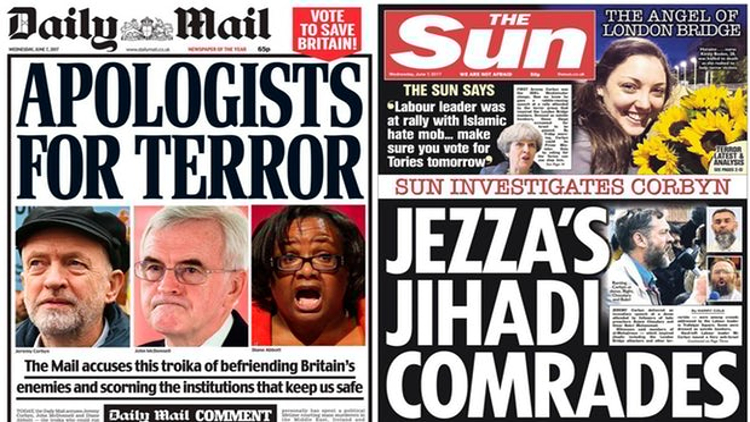In a well argued letter to the Guardian published on 12 June, Professor James Curran who writes and lectures on media history and policy, declared that:
… the reign of the tabloids is over. For weeks, the ancient bazookas controlled by Murdoch and Dacre and other press oligarchs were trained on Corbyn and McDonnell, portraying them as patrons of terror and fantasists forever shaking a magic money tree. The Campaign failed because the English Press is more distrusted than any other in Europe, its circulation is in free-fall and young people in particular get their news and political information from the internet…
The Tory party campaign was riddled with insults against the Labour Leader, too many to mention here, while the press coverage was described by the veteran political journalist Nicholas Jones as the “vilest general election reporting of my lifetime…”
Just days before polling and after the London bombing, with the election slipping away from her, May branded the Labour leader as ‘unpatriotic’ and ‘soft on terror’. There was even worse in the Sun and Mail, but Corbyn refused to indulge in personal insults. The day before the election the Mail took up 13 pages denouncing Corbyn, John McDonnell and Diane Abbot as “Apologists for terror”. So why did the tabloid Tory cheerleaders end up with egg on their faces and is it really the end of the reign of the tabloids as James Curran suggests?
An answer, as he himself alluded to, can be found in two words – social media. I must confess I am not a follower and had no real idea of its impact until I started talking to some younger people when I was ‘knocking up’ for John Grogan, the successful Labour in candidate in Keighley, West Yorkshire on election day. I was also doubtful about the TV exit poll on election night until around 2a.m. when the real results started to bear it out. It is clear that although Labour did not win the election they won the battle for votes via social media. Young voters generally don’t read the traditional press, they get their news and information from the internet. They used Youtube and Facebook to stunning effect and networked with their friends. But we have to remember that it was the party’s policies that also appealed to younger voters, after all you need a relevant programme to mobilise them around in the first place. Without it the social media campaigns would have been useless. While hundreds if not thousands turned out to Corbyn’s rallies, tens of thousands watched them on Youtube. And according to The Guardian (Cyber-Labour ourflanks Tories – 10 June) on polling day itself Labour spent considerable amounts on Twitter to promote its hashtag #forthemany. This helped deliver the younger vote and increase the party’s share of the vote to 40%.
As for the right wing tabloids (who have turned on her) they may be down but by no means out. Rupert Murdoch may have fumed at the result, but May has recalled his boy Gove to the Cabinet. And the tabloids still influence the broadcasting and TV news agendas as well as many older voters. Also the Tories took votes from Labour in some Midland and Northern areas that were strong EU leavers.
Then there is the question of Murdoch’s bid for the rest of Sky, the futures of Leveson 2 and press regulation. All unfinished business. There’s a lot to fight for. And we can win.
This article was originally published on Barry White’s blog The Spark

Cult London says
I think when we get more younger people in politics that is when they will finally start to catch on regarding the importance of social media. As long as politics is still dominated by stuffy old fashioned middle aged men, they are going to be slow on the uptake and losing out on all of those young votes!